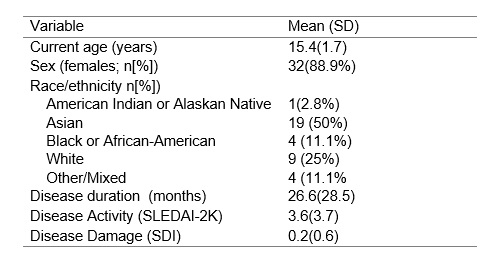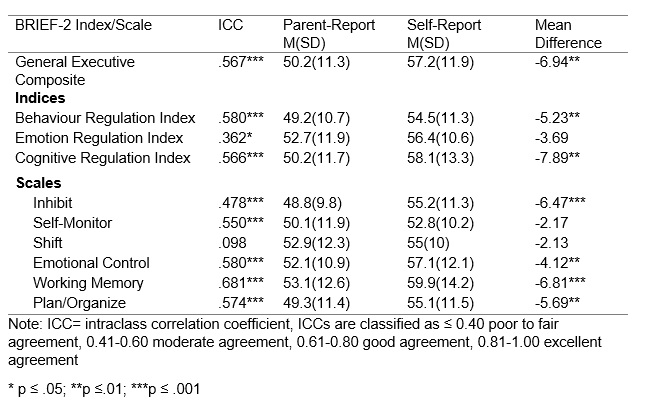Session Information
Date: Monday, November 13, 2023
Title: (1221–1255) Pediatric Rheumatology – Clinical Poster II: Connective Tissue Disease
Session Type: Poster Session B
Session Time: 9:00AM-11:00AM
Background/Purpose: Executive functions (EFs) are a set of cognitive skills that enable successful problem solving and goal-directed behavior. EFs are predictive of academic success, mental and physical health, self-care, medical adherence, and transition from the pediatric to adult medical system, thereby impacting capacity for disease self-management and quality of life. One method of measuring EF is standardized questionnaires, completed by parents or youth. Agreement between raters is not yet well known in childhood-onset systemic lupus erythematosus (cSLE) and would provide clinically valuable information about parental concern and youth’s self-awareness. Questionnaires could inform which patients may require follow-up for cognitive concerns, but it is not yet established whether these should be collected from parents, youth, or both. The aim of this study was to examine the agreement between parent and self-report ratings of EF.
Methods: Participants were youth aged 12-17 who met the ACR or SLICC criteria for SLE, and their parents. The Behavior Rating Inventory of Executive Function, Second Edition (BRIEF-2) parent- and self-report versions were collected. The BRIEF-2 is a standardized questionnaire assessing EFs in daily life with parent- and self-report versions (Figure 1). Intraclass correlation coefficients (ICCs) were calculated for the General Executive Composite (GEC), Behavior Regulation Index (BRI), Emotion Regulation Index (ERI), Cognitive Regulation Index (CRI), and six subscales. Mean T-scores between patients and parents were compared with paired-sample t-tests.
Results: Among 36 youth-parent dyads (Mean= 15.4 [SD1.7] years), ICCs between parent- and self-report (Table 2) showed moderate agreement for the overall GEC, BRI and CRI, however, the ERI showed poor agreement. For subscales, agreement was good for working memory, and moderate for inhibit, self-monitor, emotional control, and planning/organization, while ratings for the shift scale were discrepant. Mean T-score comparisons (Table 2) showed that youth rated themselves as having significantly more difficulties relative to parent-report on the GEC, BRI and CRI, as well as the inhibit, emotional control, working memory, and planning/organization subscales.
Conclusion: While ICCs indicated moderate to good consistency between most EF ratings on parent- and self-report, agreement for the ERI was poor and the shift scale was discrepant. Further analyses demonstrated that youth rated themselves as having more EF difficulties relative to parent’s report across several EF domains. Our findings suggest that direct youth self-report is needed for comprehensive assessment using the BRIEF-2 and highlights the importance of considering the youth’s own perspective of their cognitive functioning rather than relying on parent report alone. Future directions include comparing parent- and self-report BRIEFs with performance-based measures of EF.
To cite this abstract in AMA style:
ledochowski j, Mossad S, El Tal T, Lishak V, Mohamed I, Law J, Ng L, Moaf P, Jeyanathan A, Davis A, Hiraki L, Levy D, Danguecan A, Knight A. Agreement Between Parent- and Self-Report of Executive Function in Adolescents with Childhood-Onset Systemic Lupus Erythematosus [abstract]. Arthritis Rheumatol. 2023; 75 (suppl 9). https://acrabstracts.org/abstract/agreement-between-parent-and-self-report-of-executive-function-in-adolescents-with-childhood-onset-systemic-lupus-erythematosus/. Accessed .« Back to ACR Convergence 2023
ACR Meeting Abstracts - https://acrabstracts.org/abstract/agreement-between-parent-and-self-report-of-executive-function-in-adolescents-with-childhood-onset-systemic-lupus-erythematosus/



